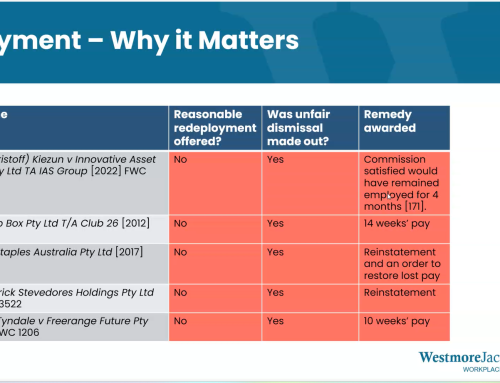
We have taken a look at the major changes to workplace law that occurred last year and the challenges these changes create for employers. Below we share our top 5 tips to help you manage these challenges in 2018.
1. Make sure your pay slips are in order
The “Vulnerable Workers” amendments to the Fair Work Act 2009 (Cth) came in to force in September last year. These amendments were aimed at addressing underpayments scandals such as the 7/11 underpayments.
Amongst other things, the amendments shifted the onus of proof to employers in underpayments cases where the employer’s pay slips or employee records were deficient.
Employers who, without a reasonable excuse, have not provided pay slips containing all the required information or have failed to make or keep sufficient employee records will now have to disprove an underpayment claim made against them.
This is a particularly significant change given how onerous and complex the pay slip and record-keeping obligations are. They can be difficult to comply with. It is very easy to inadvertently not comply with these obligations, and thus trigger the reverse onus of proof.
Employers will need to ensure they are providing pay slips with all the required information and make records of all the required employee details. Employers who fail to comply in 2018 will be substantially disadvantaged in the event an underpayments claim is made against them.
We have written a series of articles on these changes to the Fair Work Act. See our articles on the changes to franchisor and holding company liability, and the changes to the onus of proof for further details.
2. Re-asses your maximum-term contracts
Many employers use maximum-term contracts. These are contracts of employment with a set start and finish date, during which time one or more of the parties may end the contract early by providing a specified period of notice.
Until early December last year maximum-term contracts were a way to provide much-needed flexibility and security from unfair dismissal liability, particularly when future funding or work was uncertain. This was because an employee would rarely be eligible to make an unfair dismissal claim if their employment ended at the expiry of a maximum-term contract.
A Full Bench of the Fair Work Commission decision called Khayam v Navitas English Pty Ltd has changed this. The decision greatly expanded the circumstances where a maximum-term employee can successfully bring an unfair dismissal claim, including when their employment ends with the expiry of a contract.
Employers who employ employees on maximum-term contracts should carefully consider the Navitas decision. Particular attention should be given to situations where a further contract is unlikely to be offered. Employees in this situation may have greater scope to make an unfair dismissal claim.
For a more in-depth look at the new law, see our article on the Navitas decision.
3. Prepare for casual-conversion clauses
In July 2017 the Full Bench of the Fair Work Commission decided that casual conversion clauses would be inserted into all Modern Awards which do not already have such a clause. The proposed clause would give certain casual employees with 12 months or more service the right to request to be converted into a full or part-time employee. Such a request could only be refused on reasonable grounds.
Employers would also be obligated to notify casuals with 12 months’ service of the existence of this right.
While the exact details or date of implementation of these clauses has not yet been decided, it is likely these clauses will come into effect sometime in 2018.
Employers with casual employees who are working regular hours and are covered by a Modern Award will need to be wary. Employers who wish to keep their casual employees casual may need to begin considering if there are reasonable grounds to rely upon to refuse any conversion request.
4. Post-employment restraints
Employers who hope to rely upon post-employment restraints (such as non-compete clauses) contained within their employees’ contracts of employment will need to be careful to follow the terms of those contracts.
In July 2017, the Victorian Court of Appeal confirmed in Crowe Horwath v Loonethat employers who do not follow the terms of an employee’s employment contract will be very unlikely to be able to enforce that contract’s post-employment restraints against that employee, where he or she accepts the employer’s repudiation.
Employers should ensure they are following the terms of their employees’ contracts of employment. This includes terms regarding the payment of bonuses. Employers who don’t may find themselves without recourse if an employee resigns and begins taking clients.
If you would like to read more about this area of law, we have written a series of articles on post-employment restraints.
5. Review your policies
2017, like most years, saw employers make mistakes with their employment policies. Unfortunately, this creates unnecessary legal risks for employers.
A common legal problem are policies which set out a procedure for managers to follow. These can be problematic as often managers forget to follow the policy. This can create legal risk for employers in an unfair dismissal context, where an employer’s failure to follow their own policy can result in an otherwise ‘fair’ dismissal becoming unfair.
Another common issue is employers inadvertently incorporating a policy into an employee’s employment contract. This can have significant legal consequences, including opening employers up to liability for contractual damages if they breach a policy that is incorporated into a contract.
For a more in-depth look at common employment policy pitfalls, see our article on this topic.
Adam Colquhoun, Principal WestmoreJacobs
This article is general information only. It is not legal advice. If you need legal advice, please contact us.






Leave A Comment